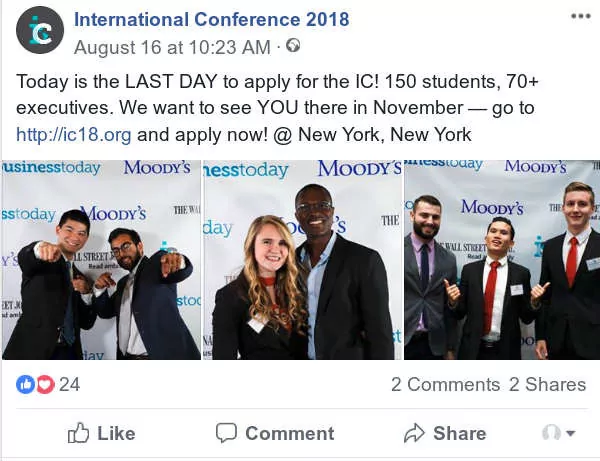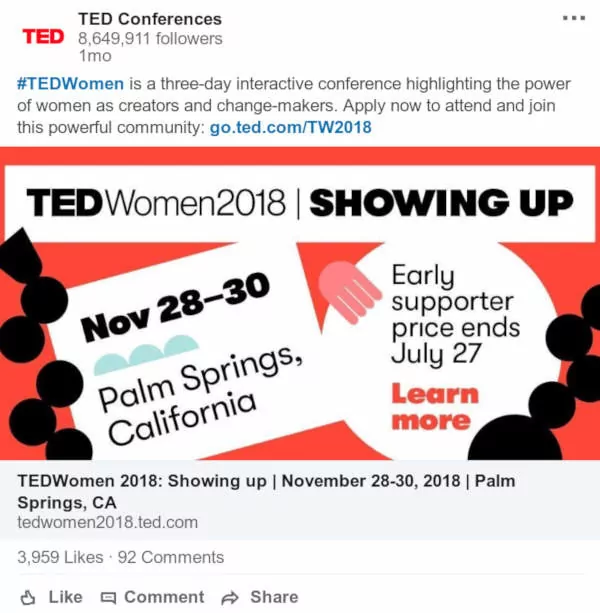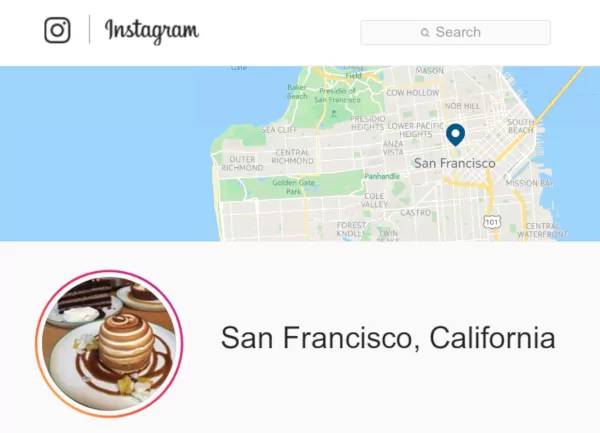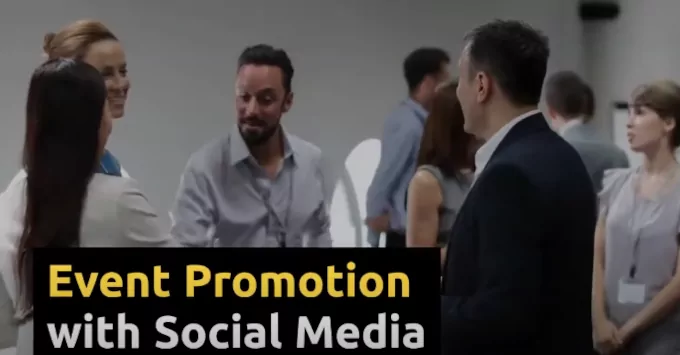Contents
- 1 Event Marketing
- 2 How to Choose the Right Social Media Network
- 3 to Promote an Event?
- 4 Facebook
- 5 LinkedIn
- 6 Instagram
- 7 How to Build a Community Around the Event?
- 8 How to Prepare Social Media for the Event?
- 9 How to Increase Engagement during the Event?
- 10 What Steps to Take After the Event?
- 11 How to Measure Event Success?
- 12 Addendum: What Are the Types of Corporate and Private Events?
Video guide with actionable steps in all event stages. This post has received very positive commentary from the event planning community.
I look into the planning and execution of event marketing campaigns in social media. It is digital marketing that I would like to talk about here and not other forms, i.e., TV, radio, printed, etc.
Event Marketing
To exploit the power of the social media channel you need a plan, expertise, and enough budget. The marketing plan must include the steps ahead, during, and after the event. Some metrics you may want to add is engagement, sign-ups, audience reach, and event buzz.
Social networks offer a great opportunity to raise awareness for your event. Read the list of Corporate Events at the end of this article.
How to Choose the Right Social Media Network
to Promote an Event?
First, you will need to decide which social platform serves better your marketing. Social networks vary in user characteristics, to succeed you need the right platforms. Not all social media suit the type of event you have in mind.
Facebook can host large-scale public events offering the possibility of laser-targeting your audience.

Facebook ad filters can filter the right attendees thus reducing advertising costs.

With LinkedIn, you can organize an event that targets a specific corporation. The corporate participants will then sync with each other on whether to attend or not. The best way to hold it is to send direct messages to the people you want to invite. Needless to say, you need to have a sort of LinkedIn connection with those people.

Instagram is not the best place to promote a corporate event, but you can still create enough buzz. Features that help you in this direction are image sharing, hashtags, and location.

How to Build a Community Around the Event?
I recommend building a community about your event so the influencers can do their magic.
Hashtags (#) are an effective way to create buzz. Your hashtag should align with the event, not overlap with others, and be easy to memorize. Allow the hashtag to grow awareness so people can familiarize themselves with it. Use the hashtag when posting to your accounts, sending invitations, making comments, etc.
How to Prepare Social Media for the Event?
As we are talking about social media, the best way to engage people is content. Content types, i.e., posts, images, videos, and graphics, will serve your event goals.
The material you share should be attractive, sharp, and clear. The content should convey a clear message and call to action (CTA). Visual elements are essential to offer people a resource to share with their peers. Keep videos short and to the point, with a professional look and background music.
You will need to redact a content calendar even months before the event so you can schedule the posting. Do not forget to include the event hashtag I mentioned above. To create buzz, you need to be consistent yet discreet. People hate seeing promotional content in every post, so use subtle methods to reach them. Post timely updates and shareable content.
Depending on the type of the event there are different tactics you can use. For example, if it is a corporate event you may:
- Setup a Google Ads PPC campaign to promote the occasion.
- Post on your blog about the opportunity and encourage them via your social accounts.
- Offer testimonials from previous happenings.
- Share videos and pictures.
- Direct post on the networks with links to the event page.
- Publish Case Studies.
- Send the agenda to your email list subscribers.
- Direct message people who might want to join the event.
- Share the schedule with the speakers.
- Do interviews with the organizers and the speakers.
- Ask influencers for their take on the event.
- Upload event banners to the headers on your social profiles.
- Offer discounts to participants and other promotional material.
- Reply to comments and questions arriving in your inbox.
How to Increase Engagement during the Event?
During the event, you have lots of fresh content to raise awareness. You may also include photos, recorded videos, live streaming, testimonials, quotes, etc.
- Make sure you share the event hashtag with the attendees.
- Upload the event photos to your social accounts (hashtag) and tag people when available.
- Network with bloggers attending the event and ask them what content they need for their posts.
- Post the quotes in your social account page, i.e., Twitter (hashtag).
- Encourage the discussion by replying to comments and questions.
- Embed the live feed to the communication platform you use for the event, and append a wall next to the stage.
- Live stream the event on Facebook and YouTube (hashtag).
- Measure every interaction with tracking tools.
What Steps to Take After the Event?
Now that everything went as expected it is time to capitalize the momentum and plan the next event.
- Thank everybody for attending, ask for feedback. Make sure you correct any flaws people share with you.
- Ask for written or video testimonials. Post them on your social accounts and your testimonials page.
- Direct messages to people who might want to join the next event (hashtag).
- Send the highlights to your email list subscribers (hashtag).
- Write a post with the event highlights, influencers, conclusions, and success metrics.
- If it is a corporate event you may consider preparing a press release with the key points.
How to Measure Event Success?
Make sure you track every interaction before and during the event. To this end, you may use tools like:
- Google Analytics (web page, Google Ads campaigns, referrals, page views, etc.).
- Social media platforms provide useful metrics such as post reach, shares, followers, comments, clicks, audience drill down, and ad performance.
- Google Webmaster Console shows you how many links the event generated. Plus it can show you the clicks on the event page.
- With metrics in hand, you can measure the performance of your event. For example, you will see how the content performed, how each post, the shares, and comments.
- Which content types created the most engagement? You will want to keep the ones that showed exceptional performance and ditch the others.
And if the content performed great, was it, in the end, beneficial for your event? Did it create the expected buzz?
Did it justify the budget you have spent? Could you optimize the marketing budget for the next event?
Are there opportunities to reach more people with your next event? Could content marketing help you grow your event to more significant dimensions?

Addendum: What Are the Types of Corporate and Private Events?
- Award Ceremonies honor corporate staff or people for their achievements. Companies, organizations, and other groups organize Award Ceremonies. Think of the importance Award events have today and how many people watch the Oscars, and the Grammys.
- Board Meetings are events where the Directors discuss strategy and company vision. Board meetings need planning and a venue that reflects professionalism and originality.
- Business Dinners are a tradition in corporations. The occasion might be a new hire, financial results, business goals, company achievements, public relations, entertainment, employee recognition, etc. Buffets are an alternative to business diners allowing the participation of more people and offering some entertainment.
- Conferences are favorite events that drive the business further. Can be business, academic, medical, scientific or technology conferences.
- Executive Retreats increase productivity, and creativity, and boost morale. Executive Retreats offer relaxation and entertainment away from stiff business meetings.
- Golf Events help build stable business relations and bring publicity.
- Incentive Events inspire employee morale and raise consumer interest.
- Incentive Travel is a marketing tool that motivates managers and customers. The trips can include exotic locations or weekend getaways. The company or a sponsor covers the travel and accommodation expenses.
- Meetings gather company people to achieve a common goal. Business meetings include oral communication or audiovisual presentations. Members go over corporate strategies, business issues, sales numbers, and marketing tactics. Still, business meetings are critical to keeping the company vision intact.
- Networking Events contribute to business success. They position the brand, contact future mergers, investors, and partners, and allow personal marketing.
- Opening Ceremonies welcome the event attendees when the event lasts several days. Opening Ceremonies include entertainment, celebrities, lots of preparation, and media coverage.
- Press Conferences promote products and launch marketing campaigns. They inform on the financial situation and sometimes do damage control. When their messaging fails, they have repercussions even to corporate stock prices. A successful Press Conference requires apt keynote speakers and hand-picked journalists of esteem.
- Private Events are birthdays, weddings, and anniversaries. Private events include only family members and friends.
- Product Launches are company statements to the public and the media. Product Launches introduce the product to investors, shareholders, partners, and customers.
- Seminars are educational events that train managers, employees, or non-corporate attendees. Types of Seminars: academic, professional, technical, private, public, series, single, commercial, informative, lecture- or dialogue-based.
- Shareholder meetings are events that companies organize on an annual basis. Shareholders review the yearly financial reports and learn about new products and services. In some cases, the shareholders vote on investments and acquisitions of other companies.
- Team Building events motivate company employees to work better as a team. Team events offer relaxation, and fun, and build trust among team members. They also build team relationships and boost morale and productivity. It can be an indoor (Bowling) or outdoor event (Ropes courses, Volleyball, Soccer). Managers expect to see a productivity increase after such events.
- Theme Parties entertain company people with their themes and fancy decoration. Favorite topics come from movies, historical eras (the twenties, the sixties), and Halloween. Decoration, food, and clothing all follow the party theme, and so does the mood.
- Trade Fairs display the company’s latest products and services. There is also an opportunity for vendors and sellers to meet. Trade Fairs have a theme, i.e., technology products and innovations. In most of the Fairs, there is public access, and many people attend the event. In Career Fairs, companies get together to recruit college graduates.
- Trade Shows showcase company products. Trade Shows allow companies to get in touch with customers and business partners. You can find their listings in local newspapers or do an online search under Expos.
- VIP Events focus on keeping the corporate key accounts as well as referral partners loyal. A non-profit organization would organize a VIP event for donors and volunteers.

